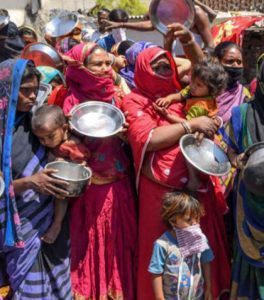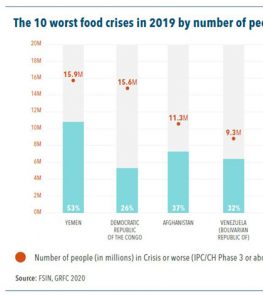Global food crisis imminent – UN report
The world is facing an unprecedented food crisis as a result of the COVID-19 pandemic and continuing conflict, according to aid agencies and a new multi-agency report.
According to the UN’s Food Price Index, global food prices are 30 per cent higher than last year despite predictions of record wheat production in 2021 and a good rice harvest in 2020.
 The world will consume a record 2.7 billion tonnes of grain this year, according to the UN’s Food and Agriculture Organization (FAO) but more people are facing severe hunger, malnutrition, and death.
The world will consume a record 2.7 billion tonnes of grain this year, according to the UN’s Food and Agriculture Organization (FAO) but more people are facing severe hunger, malnutrition, and death.
This is because of disrupted global food systems as well as conflict, COVID-19, and climate disasters, the FAO says.
Aid agency Oxfam says there is a “terrifying trajectory” of worsening food shortages.
And a new Global Report on Food Crises (GRFC) produced by the EU and the UN says 2020 was the worst of the last five years.
This year at least 142 million people will suffer at the worst three levels in a five-step food insecurity methodology, the report says.
More than 100,000 people are already at the worst, famine-like level, it says.
The G7 have already said they will direct $1.5 billion in food aid to South Sudan, Yemen, and Nigeria, which face the gravest threats.
The GRFC report says that at 135 million, the number of people in crisis in 2019 was the highest in the four years of the GRFC’s existence.
“This increase also reflected the inclusion of additional countries and areas within some countries,” the report said.
 A comparison of 50 countries over 2019 and 2020 shows the number of people suffering food crisis rose from 112 to 123 million.
A comparison of 50 countries over 2019 and 2020 shows the number of people suffering food crisis rose from 112 to 123 million.
“This reflected worsening acute food insecurity in key conflict-driven crises, notably the Democratic Republic of the Congo and South Sudan and the growing severity of drought and economic shocks as drivers in countries such as Haiti, Pakistan and Zimbabwe,” the report said.
Another 183 million people in 47 countries were said to be in ‘stressed’ conditions, at risk of slipping into ‘crisis; or worse, the report reveals.
“An estimated 75 million stunted children were living in the 55 food-crisis countries analysed. These children have limited access to sufficient dietary energy, nutritionally diverse diets, clean drinking water, sanitation and health care, which weakens their health and nutrition status, with dire consequences for their development and long-term productivity,” the report said.
The report said conflict and insecurity was still the main driver of food crises in 2019, but weather extremes and economic shocks were becoming increasingly significant.
More than half of the 77 million acutely food insecure people in countries where conflict was identified as the primary driver were in the Middle East and Asia.
The report said Africa had the largest numbers of acutely food-insecure people in need of assistance in countries badly affected by weather events, particularly in the Horn of Africa and Southern Africa, followed by Central America and Pakistan.
“In East Africa, armed conflicts, intercommunal violence and other localized tensions continued to affect peace and security, particularly in South Sudan, and continued to maintain large refugee populations in neighbouring countries, such as Uganda,” it said.
The report also noted the growing influence of economic crises on acute food insecurity levels, particularly in the Bolivarian Republic of Venezuela, Zimbabwe, Haiti and the Sudan.
“An estimated 79 million people remained displaced globally as of mid-2019 – 44 million of them internally displaced and 20 million were refugees under UNHCR’s mandate,” it said.
“More than half of these refugees were hosted in countries with high numbers of acutely food-insecure people. In countries where funding constraints have reduced assistance in refugee camps, refugees’ food security was severely threatened,” the report said.
The report said these forecasts were produced before COVID-19 became a pandemic and do not account for its impact in food crisis countries.
“The pandemic may well devastate livelihoods and food security, especially in fragile contexts and particularly for the most vulnerable people working in the informal agricultural and non-agricultural sectors. A global recession will majorly disrupt food supply chains,” the report said.
Writing in the report, UN Secretary General Antonio Guterres said: “The number of people battling acute hunger and suffering from malnutrition is on the rise yet again. And the upheaval that has been set in motion by the COVID-19 pandemic may push even more families and communities into deeper distress.”
“At this time of immense global challenges, from conflicts and climate shocks to economic instability, we must redouble our efforts to defeat hunger and malnutrition,” he said.
“We have tools and the know-how. What we need is political will and sustained commitment by leaders and nations,” Secretary General Guterres said.
See the full report here: Global Report on Food Crises
See the Food and Agriculture Organisation’s food index here: UN index.












